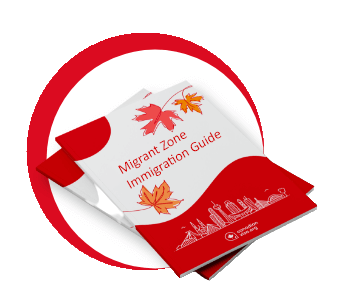Whether you're planning to move to Canada and want to see what it's like, visit your Canadian family or are purely interested in holidaying in the Great White North, you will likely need a Canadian visitor visa or a tourist visa to enter Canada. There are two types of tourist visas to Canada - Single entry, and multiple entry visitor visas. Each of these has its own Canada tourist visa requirements.
These requirements are based on the intention of your stay, your country of origin, length of your planned visit and links to your home country, amongst many others. To help figure out what you need to do to ensure you get your tourist visa, we've created a Canada visitor visa checklist. This way, you can ensure you don't leave anything out of your visa application. However, the first thing you must do is find out if you even need a visa or just an Electronic Travel Authorization (eTA).
Do I Need a Canada Visitor Visa (Also Known as Canada Tourist Visa) Tourist Visa to Canada?

Canada has a list of countries that are considered visa-exempt. You do not need a visitor visa if you are from one of the following countries. Instead, you will need an eTA. The visa-exempt countries are as follows:
| Visa-exempt Countries | ||
|---|---|---|
| Andorra | France | Montserrat |
| Anguilla | Germany | Netherlands |
| Antigua and Barbuda | Gibraltar | New Zealand |
| Australia | Greece | Norway |
| Austria | Holy See | Papua New Guinea |
| Bahamas | Hong Kong | Pitcairn |
| Barbados | Hungary | Poland |
| Belgium | Iceland | Portugal |
| Bermuda | Ireland | St. Helena |
| British Virgin Islands | Israel | Samoa |
| Brunei | Italy | San Marino |
| Cayman Islands | Japan | Singapore |
| Chile | Korea (Republic of) | Slovakia |
| Croatia | Latvia | Slovenia |
| Cyprus | Liechtenstein | Solomon Islands |
| Czech Republic | Lithuania | Spain |
| Denmark | Luxembourg | Sweden |
| Estonia | Malta | Switzerland |
| Falkland Islands | Mexico | Taiwan |
| Finland | Monaco | United Kingdom |
If you're wondering how to apply for an eTA and how they work, look at this handy guide.
What Are the Two Types of Canada Visitor Visa?

Each Canadian tourist visa has its own expressed purpose and uses.
Multiple-entry Visa
This visa will let you enter Canada for multiple periods of up to 6 months over ten years, or when your passport next expires. But, once your passport expires, you can always apply for a new Canada visitor visa.
Single-entry Visa
This lets you travel to Canada only one time, but this is usually under specific circumstances such as:
- The purpose of your entry to Canada is limited to an official visit
- You're eligible for a fee exemption
- You're taking part in a special Canadian event
- It's in keeping with the approved country procedures and guidelines
Once you leave Canada, you must apply for another visa to return.
Now that you know the types of visas let's dive into what exactly makes a visitor visa applicant eligible.
Updated Canadian Travel Requirements

While the visa types differ, the basic requirements of each visa remain essentially the same. Therefore, before you begin your application process, you must fulfill all necessary criteria via this Canada visitor visa checklist. On October 1, 2022, Immigration, Refugees and Citizenship Canada updated its requirements for all travellers entering the country by air, land or sea. Take a look at the changes below:
- A proof of COVID-19 vaccination is no longer required
- COVID-19 pre-entry and arrival tests are no longer required
- Going into Quarantine upon arrival is no longer required
- Making use of ArriveCAN is no longer required. You can, however, save time at the border by using ArriveCAN to complete your customs and immigration declaration before you leave your country of origin for Canada. According to the IRCC website, you can visit ArriveCAN: Advance CBSA Declaration to access the list of participating international airports.
- Cruise passengers no longer have to take pre-boarding tests
- Travel documents are always required
- Health checks prior to boarding planes and trains are no longer required
- Wearing masks on planes and trains is no longer required. However, you are still strongly advised to wear a high quality or respirator while traveling
What to do if You Have COVID-19 Symptoms
You should not travel to Canada, should you have COVID-19 symptoms. If COVID-19 symptoms appear en route to Canada or as you arrive:
- You must inform flight attendants, cruise staff or a border official as soon as you arrive
- You'll possibly be referred to a Quarantine Officer to have your health assessed
- Do not use public transport
- Take a look at what COVID-19 requirements for when you test positive are for the province you provincial or territory you are entering.
Remember, to get a tourist visa to Canada, you must also:
- Be in good health
- Have a valid travel document such as a passport
- Have no criminal or immigration-related convictions
- In particular, if you've been convicted of any criminal activity, human rights violations or organized crime, you will likely be rejected for any Canadian visa.
- Have clear ties to your home country
- Prove you will leave Canada once you're completed your visit
- Have enough funds to cover your expenses. This amount depends on your accommodation plans and whether or not you will need to pay for your accommodation (like with a hotel or Airbnb)
If you're unsure how to fulfill all of the Canadian visitor visa requirements or how to get your required documents, click the button below to talk to a Regulated Canadian Immigration Consultant (RCIC). RCICs can give you a full eligibility assessment and ensure you take every step of your application process correctly.
Regulated Canadian Immigration Consultants provide expert knowledge concerning all the necessary documents and requirements for a Canada Visitor Visa, as well as programs that go beyond temporary visas and pave the way to Canadian permanent residency.
What Documents Are Required For a Canada Visitor Visa?

Before you begin your visitor visa application process, you will need the following documentation:
- Travel history (Optional)
- Basic Itinerary (Optional)
- Bank Statement (Optional)
- Travel document (Optional)
- Use of a representative form (IMM 5476) if you've used a representative
- Authority to release personal information to a designated individual form - IMM 5475 (Optional)
- Family information form(IMM 5645)
- This is particularly if you have children under 18
Documents required for minors:
Please note that minor children (children under 18 years old) will be required to have the same document as adult travellers. This is to ensure the safety of minors, and those who do not have the necessary documents will be scrutinized closely.
Minor's Travelling Alone
Children who are travelling to Canada alone will need the following documents:
- Own Passport
- Copy of birth certificate
- Letter of authorization signed by both parents/legal guardians with contact information (in English or French if possible)
Minor's Travelling With One Parent or Guardian
Children who are traveling to Canada with one parent or legal guardian will require the following documents:
- Child's passport
- Copy of birth certificate
- Letter of authorization signed by the parent not accompanying the child with contact details (in English or French if possible)
Parents that are Separated, Divorced, or Have Shared Custody
- Copies of legal custody documents
- Letter of authorization from the other parent/guardian
Parents that are Separated or Divorced and One Parent Has Sole Custody
- Letter of authorization signed by that parent
- Custody decree
One of the Parents is Deceased
- Copy of death certificate
Adoptive Parents or Legal Guardian
- Copy of guardianship/adoption papers
Minor Travelling to Canada With Anyone Other Than Parents or Legal Guardian
- Written consent from parents or guardians to supervise the child (include contact details of parents/guardians)
- Copy of parents' or legal guardian's signed passports or national identity cards
How do I Apply For a Canadian Visitor Visa?

Once you've made sure you fulfill all criteria, collected all of the required documents and ensured you have every visa application form, you can apply online via the government of Canada's website. You do this in 3 simple steps:
Step 1: Create an Account
You create an account on the government's official website. In doing this, you will submit certain details, such as your reason for going to Canada, which will help the government of Canada determine which application process you must undertake.
Step 2: Upload Your Documents
At this point, you upload all documents specified above to prove the details you stated when you created your account.
Step 3: Pay the Application Processing Fee
Like with every visa, the visitor visa has certain processing costs. They are as follows:
| Fees | CA$ |
|---|---|
|
Visitor visa (including super visa) - per person Single or multiple entry temporary resident visa |
100 |
|
Visitor visa – per family (1 fee per family of 5 or more people) |
500 |
| Extend your stay as a visitor – per person | 100 |
|
Restore your status as a visitor |
200 |
Once you've completed these three steps, you may submit your application for processing. Once your application is uploaded, you may be asked to present your biometrics. Here's a handy guide for a full breakdown of what biometrics for Canada visas are and how to submit them.
Why Travel to Canada
The Great White North is a top travel destination with many unique offerings to offer visitors. Here are some of the reasons you should consider a visit.Diversity
Canada is a destination of great diversity. It is a melting pot in which all cultures are celebrated, making it ideal for immigrants and tourists alike. But that's not where the diversity ends. As the world's second-largest country it has a vast range of climates, landscapes, cities and rural settings.
Charming in Every Season
While many Canadians may need to escape their icy winters, the country is considered a winter wonderland by winter sports enthusiasts and those seeking the novelty of snow-capped just about everything.
But it's not the winter season that is magical. There's the charm of the fall's rust-coloured leaf aesthetic, the beautiful blooming of tulips and cherry blossoms in the spring and the impressive variety of summer activities during the summer months. It has to be said, though, there is no shortage of splendour in the Great White North, regardless of the season you choose to wander through it.
The Whole Family Will Love it!
With an abundance of the most magnificent outdoor settings, Canada is one of the most family-friendly countries to visit. You and your loved ones can enjoy the snow together, explore the great lakes, head out for a hike or two in the Canadian Rockies or explore the country's amazing national parks and museums. There is no shortage of fun things to do as a family.
Endless Opportunities for Adventure
Canada is the adventurer's dream destination. For the thrill-seekers, there's skiing, snowboarding and some of the most intense hiking and climbing trails to conquer, as well as golfing, fishing, mountain biking, kayaking, canoeing and fishing.
Entertainment
There's no shortage of events and festivals in the land of the maple leaf. So no matter the season, you'll find something to attend. Look out for:
- The Celtic Colours International Festival, Nova Scotia
- The Celebration of Light, Vancouver
- The Calgary Stampede
- The Edmonton Folk Music Festival
- The TorontoInternational Film Festival
- The Canadian Tulip Festival, Ottawa
- The Quebec Winter Carnival, Quebec City
Travel to Canada Made Simple
While a tourist visa isn't the most complex visa to get for Canada, you still need to submit the correct documents timely and ensure that the evidence of your connection to your home country is submitted and ensure you fulfill all of the Canada Visitor visa requirements. Despite how extensive the Canada visitor visa checklist is, submitting only those documents on the IRCC checklist isn't enough to make your case that you will return to your home country after your visit. To ensure you have everything you need for your trip to Canada, click the button below to speak to an RCIC and ensure everything happens smoothly.
FAQs
Is Canada's Visitor Visa Currently Open?
Yes, the Canada Visitor Visa has been open for all vaccinated tourists since September 7, 2021. However, On October 1, 2022, all COVID-19 border requirements, including vaccination, use of ArriveCAN, as well as testing and quarantine or isolation requirements, ended for all travellers entering the country.
How Can I Extend my Stay in Canada After my Visitor Visa Expires?
If you want to prolong your stay in Canada after six months, you can apply for a visitor record which will give you a new expiry date. You must apply at least 30 days before your visitor visa expires. You apply online on the Canadian government website.
How Long is the Canada Tourist Visa Processing Time
The Canada tourist visa processing time varies from country to country and whether or not you're applying from inside or outside of Canada. For example, the Canada tourist visa processing time can be approximately four months for a person applying from India.
Is a Visitor or Tourist Visa the Same as a Temporary Resident Visa?
Yes. A temporary resident visa is another name for a visitor or tourist visa. This, however, is different from a Working Holiday Visa, which is predicated on you working while in Canada. If this sounds more like something you would be into, look at the Canadian Working Holiday visa introduction.




